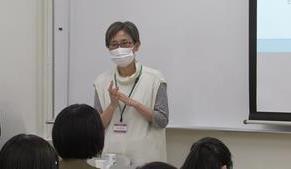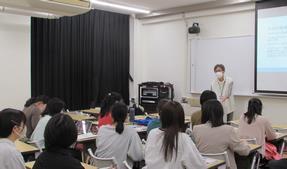- Global Collaboration Center
- Activity
- The report on 27th SDGs (Sustainable Development Goals) Seminar “Project for Expansion of New Curriculum in Mozambique – JICA’s Efforts in developing counties”(April 2023)
ページの本文です。
The report on 27th SDGs (Sustainable Development Goals) Seminar “Project for Expansion of New Curriculum in Mozambique – JICA’s Efforts in developing counties”(April 2023)
2024年4月8日更新
On April 25, 2023, the 27th SDGs Seminar titled "Project for Expansion of New Curriculum in Mozambique: JICA’s Efforts in developing countries" was held. Ms. Miho Ota, the principal consultant at Koei Research & Consulting Inc. presented at the seminar. Ms. Ota is a graduate of the Faculty of Home Economics, Department of Child Studies, at Ochanomizu University. After graduation, she worked in the private sector, then served as a JICA Volunteer (Kaigai-Kaihatsu-Seinen). She later earned a Master’s degree in International Development Policy from Sanford School of Public Policy, Duke University. Since then, she has worked as a JICA expert on education projects and research studies in Bolivia, Honduras, and other countries around the world. Currently, as a principal consultant for a development consulting firm, she is involved in a technical cooperation project for primary education in Mozambique. In the lecture, Ms. Ota gave a detailed presentation on the project, PRICEP, in which she is currently engaged.
Located in southeastern Africa, Mozambique is about twice the size of Japan. Its gross national income per capita is US$480 (as of 2019), which is about one-hundredth of Japan’s. The net enrollment rate for secondary education is only 18.6% (as of 2015). Japan’s development cooperation policy for Mozambique prioritizes “human and social development” and “improving the quality of education”, in addition to economic growth and peacebuilding.
The project, PRICEP, aims to enhance mathematics and science learning in primary education based on JICA’s cooperation policy of “Textbook and Learning Material Development and Learning Improvement” and its “Integrated Approach to Improving Learning.” JICA’s “Comprehensive Approach to Improving Learning” focuses on strengthening the “learning cycle” by ensuring consistency among the curriculum, textbooks, learning materials, teaching methods, and academic assessment. Additionally, PRICEP has a project objective of “improved learning in mathematics and science,” along with an overarching goal, or “super-goal,” that ultimately seeks to enhance children’s academic performance through improved learning.
Implementing a project may seem easy. However, I was deeply impressed by the many difficulties and realities that can only be understood by Ms. Ota, who is involved in this field. First, when she began revising textbooks and teaching materials, she faced challenges in starting revisions from the middle of the 3rd and 4th grades due to copyright issues. Regarding science, the concept of “science based on experiment and observation” is not understood by students, no matter how many years it takes. Moreover, the teachers themselves sometimes seem to have a limited understanding of the content of the textbooks. Although Mozambique is twice the size of Japan, utilizing ICT is hard due to underdeveloped infrastructure and other factors, making it difficult to train teachers in schools across the country. Another challenge the project faces is the deadline for completing the manuscripts of the textbooks and teaching materials. Since they are printed in India, the manuscripts must be submitted much earlier than when they are actually needed. I was impressed by the fact that Ms. Ota’s team never tried to impose the Japanese way of doing things, despite these challenges. Instead, they proceeded with the project by emphasizing consensus and taking into account the opinions and circumstances of the partner country.
Before the lecture, I was not familiar with the details of international cooperation projects. However, after listening to Ms. Ota’s lecture, I realized that these projects are being carried out in “cooperation” with the partner country while overcoming various difficulties. Upon reviewing some of Mozambique’s textbooks, I noticed that many of the issues faced in the past have been improved, and I felt that this is the result of the efforts of those involved in the project. I became aware that there are individuals dedicated to providing better education to as many children as possible. I hope to contribute to such efforts in some way.
(Riko Hirai, senior student, Department of Human and Social Sciences, Faculty of Letters and Education)












